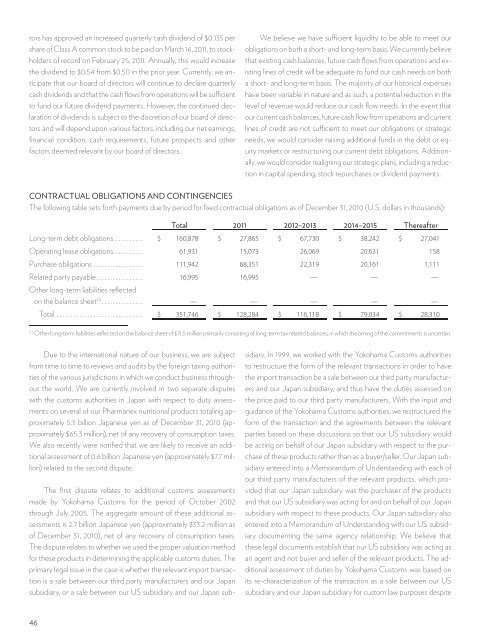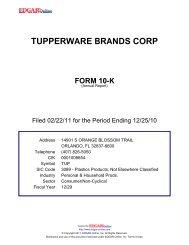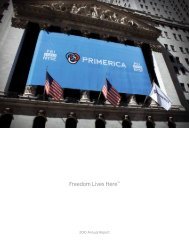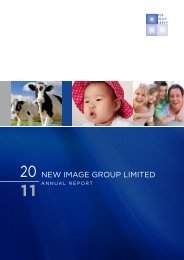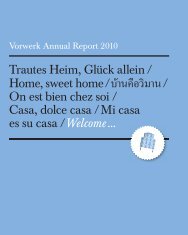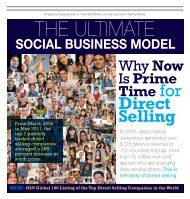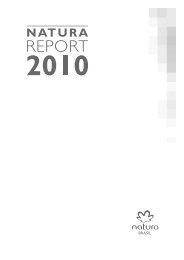Nu Skin 2010 Annual Report - Direct Selling News
Nu Skin 2010 Annual Report - Direct Selling News
Nu Skin 2010 Annual Report - Direct Selling News
You also want an ePaper? Increase the reach of your titles
YUMPU automatically turns print PDFs into web optimized ePapers that Google loves.
tors has approved an increased quarterly cash dividend of $0.135 per<br />
share of Class A common stock to be paid on March 16, 2011, to stockholders<br />
of record on February 25, 2011. <strong>Annual</strong>ly, this would increase<br />
the dividend to $0.54 from $0.50 in the prior year. Currently, we anticipate<br />
that our board of directors will continue to declare quarterly<br />
cash dividends and that the cash flows from operations will be sufficient<br />
to fund our future dividend payments. However, the continued declaration<br />
of dividends is subject to the discretion of our board of directors<br />
and will depend upon various factors, including our net earnings,<br />
financial condition, cash requirements, future prospects and other<br />
factors deemed relevant by our board of directors.<br />
We believe we have sufficient liquidity to be able to meet our<br />
obligations on both a short- and long-term basis. We currently believe<br />
that existing cash balances, future cash flows from operations and existing<br />
lines of credit will be adequate to fund our cash needs on both<br />
a short- and long-term basis. The majority of our historical expenses<br />
have been variable in nature and as such, a potential reduction in the<br />
level of revenue would reduce our cash flow needs. In the event that<br />
our current cash balances, future cash flow from operations and current<br />
lines of credit are not sufficient to meet our obligations or strategic<br />
needs, we would consider raising additional funds in the debt or equity<br />
markets or restructuring our current debt obligations. Additionally,<br />
we would consider realigning our strategic plans, including a reduction<br />
in capital spending, stock repurchases or dividend payments.<br />
CONTRACTUAL OBLIGATIONS AND CONTINGENCIES<br />
The following table sets forth payments due by period for fixed contractual obligations as of December 31, <strong>2010</strong> (U.S. dollars in thousands):<br />
Total 2011 2012–2013 2014–2015 Thereafter<br />
Long-term debt obligations. . . . . . . . . . . $ 160,878 $ 27,865 $ 67,730 $ 38,242 $ 27,041<br />
Operating lease obligations . . . . . . . . . . . 61,931 15,073 26,069 20,631 158<br />
Purchase obligations . . . . . . . . . . . . . . . . . . 111,942 68,351 22,319 20,161 1,111<br />
Related party payable . . . . . . . . . . . . . . . . . 16,995 16,995 — — —<br />
Other long-term liabilities reflected<br />
on the balance sheet (1) . . . . . . . . . . . . . . . — — — — —<br />
Total . . . . . . . . . . . . . . . . . . . . . . . . . . . . . . . $ 351,746 $ 128,284 $ 116,118 $ 79,034 $ 28,310<br />
(1)<br />
Other long-term liabilities reflected on the balance sheet of $71.5 million primarily consisting of long-term tax related balances, in which the timing of the commitments is uncertain.<br />
Due to the international nature of our business, we are subject<br />
from time to time to reviews and audits by the foreign taxing authorities<br />
of the various jurisdictions in which we conduct business throughout<br />
the world. We are currently involved in two separate disputes<br />
with the customs authorities in Japan with respect to duty assessments<br />
on several of our Pharmanex nutritional products totaling approximately<br />
5.3 billion Japanese yen as of December 31, <strong>2010</strong> (approximately<br />
$65.3 million), net of any recovery of consumption taxes.<br />
We also recently were notified that we are likely to receive an additional<br />
assessment of 0.6 billion Japanese yen (approximately $7.7 million)<br />
related to the second dispute.<br />
The first dispute relates to additional customs assessments<br />
made by Yokohama Customs for the period of October 2002<br />
through July 2005. The aggregate amount of these additional assessments<br />
is 2.7 billion Japanese yen (approximately $33.2 million as<br />
of December 31, <strong>2010</strong>), net of any recovery of consumption taxes.<br />
The dispute relates to whether we used the proper valuation method<br />
for these products in determining the applicable customs duties. The<br />
primary legal issue in the case is whether the relevant import transaction<br />
is a sale between our third party manufacturers and our Japan<br />
subsidiary, or a sale between our US subsidiary and our Japan subsidiary.<br />
In 1999, we worked with the Yokohama Customs authorities<br />
to restructure the form of the relevant transactions in order to have<br />
the import transaction be a sale between our third party manufacturers<br />
and our Japan subsidiary, and thus have the duties assessed on<br />
the price paid to our third party manufacturers. With the input and<br />
guidance of the Yokohama Customs authorities, we restructured the<br />
form of the transaction and the agreements between the relevant<br />
parties based on these discussions so that our US subsidiary would<br />
be acting on behalf of our Japan subsidiary with respect to the purchase<br />
of these products rather than as a buyer/seller. Our Japan subsidiary<br />
entered into a Memorandum of Understanding with each of<br />
our third party manufacturers of the relevant products, which provided<br />
that our Japan subsidiary was the purchaser of the products<br />
and that our US subsidiary was acting for and on behalf of our Japan<br />
subsidiary with respect to these products. Our Japan subsidiary also<br />
entered into a Memorandum of Understanding with our US subsidiary<br />
documenting the same agency relationship. We believe that<br />
these legal documents establish that our US subsidiary was acting as<br />
an agent and not buyer and seller of the relevant products. The additional<br />
assessment of duties by Yokohama Customs was based on<br />
its re-characterization of the transaction as a sale between our US<br />
subsidiary and our Japan subsidiary for custom law purposes despite<br />
46


